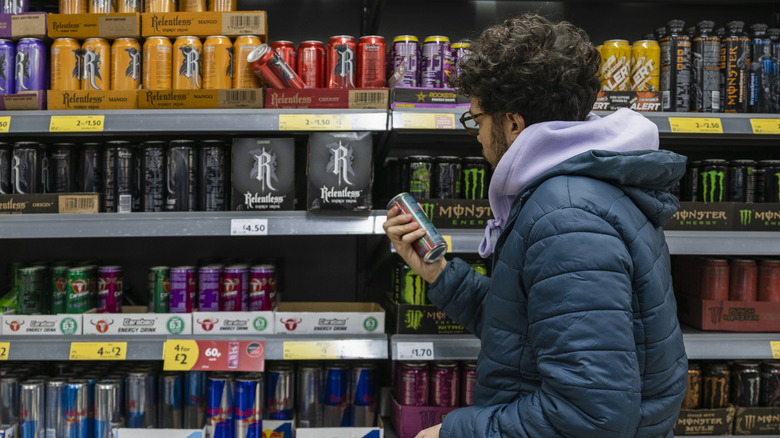The Caffeinated Beverage That Increases Your Risk Of Blood Clots
They may be small, but blood clots can have a devastating impact on our health. While the U.S. Centers for Disease Control and Prevention (CDC) reports that factors like smoking, pregnancy, hospitalization, or having cancer can increase one's susceptibility to blood clots, it appears that drinking energy drinks may also increase the risk, according to 2023 research published in the Journal of Investigative Medicine High Impact Case Reports.
Blood clotting is an essential function to ensure that your body doesn't lose too much blood when you bleed. However, the CDC states that a person dies every 6 minutes from a blood clot. Also known as venous thromboembolism (VTE), blood clots are congealed masses made up of platelets and fibrin that can obstruct blood flow through your veins and arteries, explains the Cleveland Clinic. In serious cases, blood clots that form within your vital organs, such as the brain or heart, can be life-threatening.
Although some risk factors may be beyond our control, we can help protect ourselves against blood clots with healthy habits — such as minimizing our energy drink intake.
Energy drinks may boost platelet adhesion
America loves caffeine; just a quick glance at any Starbucks' drive-thru line can tell you that. Yet some people prefer to get their caffeine fix from alternate sources, like energy drinks. According to a 2023 Statista survey of over 10,000 participants, 33% of people ages 18 through 29 reported consuming energy drinks on a regular basis. The same was true for 36% of adults ages 30 through 49, as well as 15% of middle-aged to older adults. However, research has shown that energy drinks may create favorable conditions for blood clots to form in the body.
In a 2015 study published in The Journal of Surgical Research, 32 healthy adults between the ages of 18 and 40 were given 30 minutes to consume either a bottle of water or a sugar-free energy drink following an overnight fast. The experiment was performed twice, separated by one week. The study team analyzed blood coagulation and platelet function prior to the experiment as well as 1 hour afterwards and found a link between energy drink consumption and increases in platelet aggregation, or the adhesion of platelets clumping together (via Morgan & Claypool Life Sciences). As a result, the researchers concluded that energy drinks may potentially put your heart health at risk.
The risks of overconsumption of energy drinks
Those who push the limits of caffeinated energy drink consumption may be particularly at risk for adverse cardiovascular events. According to the previously mentioned 2023 case report, a man in his late 20s experiencing a heart attack went to the hospital following 8 hours of intense chest pain extending to his left shoulder. His symptoms developed 4 hours after having drank five energy drink cans, in addition to having drank multiple energy drinks daily for the last few weeks.
In the research, the study team highlighted energy drinks' hypercoagulation effects and the subsequent increased risk of blood clots. While further investigation is needed, experts emphasize the need for increased awareness around the potential health hazards of energy drinks and the importance of keeping consumption to a minimum. The U.S. Food and Drug Administration (FDA) advises keeping caffeine intake under 400 milligrams daily, as exceeding this amount may induce harmful side effects. Mind you, different energy drinks have different amounts of caffeine, so be sure to always check the product label.



